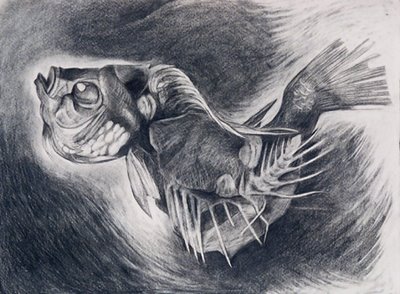
|
Bahamut
is a vast fish that supports the
earth in Arabian
mythology. In some
sources, Bahamut is described as having a head resembling a hippopotamus or
elephant.In Jorge Luis
Borges' Book of Imaginary Beings, Bahamut
is a beast of Arabic mythology "altered and magnified"from Behemoth. In Arabic myth, Bahamut is a
giant fish, described as so immense that a human cannot bear its sight; "[a]ll
the seas of the world, placed in one of the fish's nostrils, would be like a
mustard seed laid in the desert."
One tradition describes Bahamut as a fish floating in a fathomless sea. On
the fish is a bull called Kujata,on the bull, a
ruby mountain; on the mountain, an angel; over the angel, six hells; over the
hells, earth; and over the earth, seven heavens. Another tradition places the
Earth's foundation on water, the water on a crag, the crag on a bull's forehead,
the bull on a bed of sand, the sand on Bahamut, Bahamut on a stifling wind, and
the wind on a mist; what is beneath the mist is unknown. In a similar
telling of the hierarchy, Bahamut supports a layer of sand, on which stands a
giant bull, on whose forehead rests a mountain of rock which holds the waters in
which the earth is located.
According to Borges, Bahamut is the giant fish that Isa (Jesus) beholds in the 496th
night of the One Thousand and One Nights.
Bahamut in this telling is a giant fish swimming in a vast ocean. It carries a
bull on its head; the bull bears a rock, and above the rock is an angel who
carries the seven stages of the earths. Beneath Bahamut is an abyss of air, then
fire, and beneath that a giant serpent called Falak.
Upon seeing Bahamut, Isa passes into unconsciousness:
At this sight Isa fell down aswoon, and when he came to himself, Allah spake to him by inspiration, saying, 'O
Isa, hast thou seen the fish and comprehended its length and its breadth?' He
replied, 'By Thy honour and glory, O Lord, I saw no fish; but there passed me by
a great bull, whose length was three days' journey, and I know not what manner
of thing this bull is.' Quoth Allah, 'O Isa, this that thou sawest and which was
three days in passing by thee, was but the head of the fish; and know that every
day I create forty fishes like unto this.'
Borges cites the idea of Bahamut as part of a layered cosmology as an illustration of the cosmological
proof of the existence of God, which infers a first cause from the
impossibility of infinite prior causes. He also draws
parallels between Bahamut and the mythical Japanese fish Jinshin-Uwo
|
 Copyright(c) 2007
- 2020. All rights reserved. Copyright(c) 2007
- 2020. All rights reserved.
|

![]() Copyright(c) 2007
- 2020. All rights reserved.
Copyright(c) 2007
- 2020. All rights reserved.